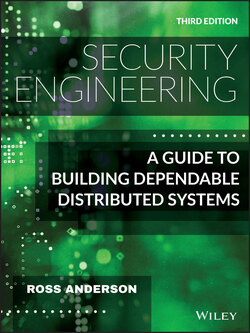Читать книгу Security Engineering - Ross Anderson - Страница 8
Preface to the Second Edition
ОглавлениеThe first edition of Security Engineering was published in May 2001. Since then the world has changed.
System security was one of Microsoft's lowest priorities then; it's now one of the highest. The volume of malware continues to increase along with the nuisance that it causes. Although a lot of effort has gone into defence – we have seen Windows NT replaced by XP and then Vista, and occasional service packs replaced by monthly security patches – the effort put into attacks has increased far more. People who write viruses no longer do so for fun, but for profit; the last few years have seen the emergence of a criminal economy that supports diverse specialists. Spammers, virus writers, phishermen, money launderers and spies trade busily with each other.
Cryptography has also moved on. The Advanced Encryption Standard is being embedded into more and more products, and we have some interesting developments on the public-key side of things too. But just as our algorithm problems get solved, so we face a host of implementation issues. Side channels, poorly designed APIs and protocol failures continue to break systems. Applied cryptography is harder than ever to do well.
Pervasive computing also opens up new challenges. As computers and communications become embedded invisibly everywhere, so problems that used to only afflict ‘proper computers’ crop up in all sorts of other devices too. What does it mean for a thermometer to be secure, or an air-conditioner?
The great diversity of intelligent devices brings with it a great diversity of interests and actors. Security is not just about keeping the bad guys out, but increasingly concerned with tussles for power and control. DRM pits the content and platform industries against consumers, and against each other; accessory control is used to tie printers to their vendors' cartridges, but leads to antitrust lawsuits and government intervention. Security also interacts with safety in applications from cars through utilities to electronic healthcare. The security engineer needs to understand not just crypto and operating systems, but economics and human factors as well.
And the ubiquity of digital devices means that ‘computer security’ is no longer just a problem for a few systems specialists. Almost all white-collar crime (and much crime of the serious violent sort) now involves computers or mobile phones, so a detective needs to understand computer forensics just as she needs to know how to drive. More and more lawyers, accountants, managers and other people with no formal engineering training are going to have to understand system security in order to do their jobs well.
The rapid growth of online services, from Google and Facebook to massively multiplayer games, has also changed the world. Bugs in online applications can be fixed rapidly once they're noticed, but the applications get ever more complex and their side-effects harder to predict. We may have a reasonably good idea what it means for an operating system or even a banking service to be secure, but we can't make any such claims for online lifestyles that evolve all the time. We're entering a novel world of evolving socio-technical systems, and that raises profound questions about how the evolution is driven and who is in control.
The largest changes, however, may be those driven by the tragic events of September 2001 and by our reaction to them. These have altered perceptions and priorities in many ways, and changed the shape of the security industry. Terrorism is not just about risk, but about the perception of risk, and about the manipulation of perception. This adds psychology and politics to the mix. Security engineers also have a duty to contribute to the political debate. Where inappropriate reactions to terrorist crimes have led to major waste of resources and unforced policy errors, we have to keep on educating people to ask a few simple questions: what are we seeking to prevent, and will the proposed mechanisms actually work?
Ross Anderson
Cambridge, January 2008
